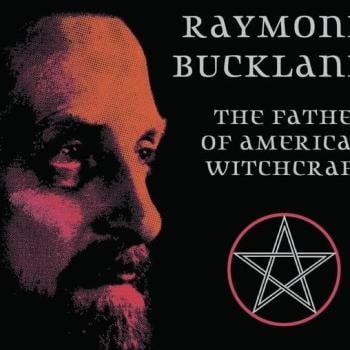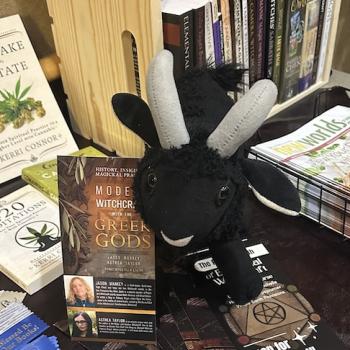This past weekend one of my Facebook friends posted a status update that caught me a little off guard. She wrote that “If any of my friends likes the page of Donald Trump, or has friends that do, they should unfriend me immediately.” I thought it was a little reactionary, especially the last part. I have friends that like the page of Donald Trump, and probably for a variety of reasons. Some of them no doubt want to keep up with Trump and/or all the drama, fear, and ridiculousness that follows him, and I’m sure some of my friends (gasp!) follow him because they actually like him.
I greatly dislike Trump, but I’m not going to unfriend someone over Facebook about it. I’ve got nearly 2000 friends at the book of Face, and many of them from my high school years like Trump. I’ve even got a few from a couple of Pagan festivals that I’ve met much more recently who like Trump. I don’t think anyone believes that I share the opinion of those folks that Trump is a “good guy,” or worth voting for. Their opinions are their own, which is obvious when the inevitable arguments online break out.

I remain friends with people who disagree with me because I don’t think we will ever change the world by only talking to and interacting with those that agree with us. It’s not the choir that needs to hear the message, or even the people in the immediate audience, it’s those outside the coliseum. We will never engage with those folks if we insist on operating in world that’s exclusive to our point of view.
Back in college I had a few Evangelical acquaintances who were a part of a “Christian only” eco-system. Originally we were all friends, but when it became obvious to them that I wasn’t joining their world the friendships ended, and I wasn’t alone. This little group only went to Christian parties, only went to public events that were “Christian” or “family friendly;” they were basically disengaged from anything outside their bubble. “Bubble culture” is rapidly becoming the new norm in the United States (and other parts of the world) and it’s quickly becoming a part of Paganism too.
To some degree, I’m completely on board with creating a Pagan culture. I support a few Pagan websites, and I buy all sorts of books from Pagan authors and Pagan-friendly publishing houses. At festivals I buy art from Pagan artists, and I’ve been known to buy music from Pagan musicians regardless of whether or not I like their work. I like supporting Pagans, I believe it’s important to support Pagans, and I’d much rather buy an item from a Pagan artisan than give my money to some giant corporation in China.
But Paganism can’t simply exist in its own little bubble. Part of the reason I write at Patheos is because I like that my writing gets outside of the Pagan bubble. Histories of Christmas and Halloween aren’t just for Witches, they are for everybody. And if someone from outside the Pagan sphere reads my work and thinks “hey, not all of those Pagans are bad” then I’ve probably done some good.
Part of the reason I’m here today is that my father was enlightened enough to let me read whatever I wanted, and he exposed me to a wide range of things (and I write that thinking he probably voted for Trump). I didn’t enter Paganism through a Pagan bubble, it was very much because Paganism was interacting with a larger world. I found books on Witchcraft at my local (Southern) library, and books on Paganism at large chain stores whose values I most certainly disagree with on occasion.
On the high end of things, there are probably two million Pagans in the United States, which is a statistical blip when comparing the number of Pagans to the number of Christians in the country. If we want our religious liberties protected we are probably going to have to work with Muslims, Jews, Progressive Christians, Atheists, enlightened Catholics, the ACLU, and everyone else who values the separation of church and state and the right of people to worship as they wish. We aren’t going to get there if we as a community withdraw from the bigger picture.

Life is often a series of hard choices, and often involves a whole lot of compromise. There are very few places online or in the real world that totally align with all of my (or your) values. I use Facebook on a daily basis, and that’s a company with pro-Trump capitalist Peter Thiel on its board. Just yesterday I shared a link from Amazon about my latest book, and Amazon is a company I try and avoid because of how they treat their warehouse workers. I shop at the Target down the street from my house, and while Target supports some progressive groups, they are also anti-union. I shop there because at least my city gets some of the sales tax and I need toilet paper. I’ve been watching The Simpsons for twenty years now, even though they are on Rupert Murdoch’s Fox Television Network. But they do good work on that show, and use the airwaves of a conservative company to share a mostly progressive message.
I’m going to remain friends with my acquaintances who like Trump and other people I disagree with, because to disengage with them completely will never change their hearts and minds. This doesn’t mean I’m going to tolerate racism, transphobia, or misogyny, just the opposite. I’ll call out the awful when I see it, and try to do so in a way that might help people see the error of their ways. And I’ll continue to post here at Patheos because it’s where I think I can be the most effective.
Life is complicated, life is messy, there are no easy answers, but we will only change the world if we engage with more than just one little slice of it.

















